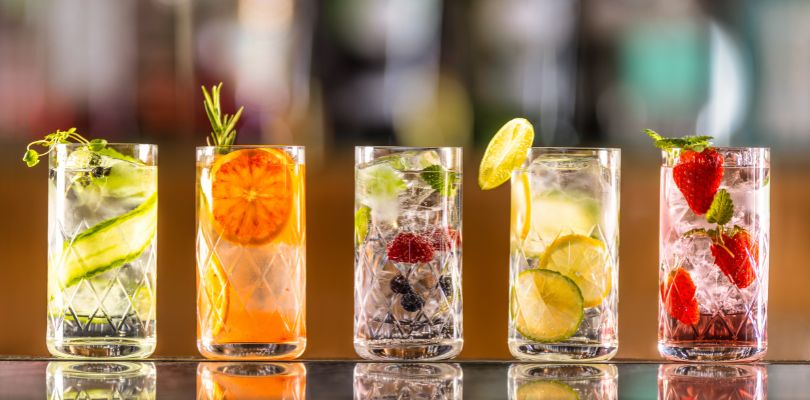Alleviate Symptoms by Avoiding These Drinks
Stomach cancer is a serious disease that affects the lining of the stomach and can cause numerous health complications. While treatments such as surgery, chemotherapy and medications play a key role in managing stomach cancer, dietary choices are also critical. You can talk to your doctor about Lonsurf, a medication that helps stop the growth and spread of cancer cells throughout the body. Certain foods and drinks can irritate the stomach lining, worsen symptoms or interfere with treatment. In this article we review six drinks to avoid with stomach cancer, and how they make symptoms worse.
1. Alcoholic Beverages
Alcohol is one of the worst drinks for individuals with stomach cancer. Not only does alcohol irritate the stomach lining, but it can also exacerbate inflammation, cause acid reflux and lead to ulcers. Alcohol weakens the body’s natural defense mechanisms, impairing the stomach’s ability to heal and fight cancer cells. Moreover, regular consumption of alcohol has been linked to an increased risk of developing stomach cancer in the first place, and continuing to drink alcohol after diagnosis can worsen symptoms.
Alcohol can also interfere with treatments such as chemotherapy or medications by impairing the liver’s ability to process and metabolize drugs. This may reduce the effectiveness of cancer treatments and lead to more severe side effects. It is recommended to avoid all forms of alcohol, including wine, beer and spirits, while managing stomach cancer.
2. Caffeinated Beverages
Caffeinated drinks, such as coffee, tea and energy drinks can worsen stomach cancer symptoms. Caffeine increases acid production in the stomach, which can irritate the stomach lining, cause discomfort and exacerbate symptoms like heartburn and indigestion. The additional stomach acid can further damage the already sensitive tissue, increasing pain and possibly causing bleeding in severe cases. Energy drinks, in particular, not only contain high levels of caffeine but are also packed with sugar and artificial ingredients, making them doubly harmful.
While some people rely on caffeine to boost their energy levels, especially during treatment, it is advisable to avoid it entirely or replace it with caffeine-free alternatives. Herbal teas that are gentle on the stomach, such as chamomile or ginger tea, are better options.
This article will explore some treatments for lymphoma, looking at the best options. Read on to learn more here.
3. Carbonated Beverages
Carbonated drinks, including soda, sparkling water and fizzy energy drinks, are not ideal for individuals with stomach cancer. The carbonation in these beverages can cause bloating, gas and pressure in the stomach, which can exacerbate discomfort, especially for those already suffering from stomach pain or indigestion. The gas bubbles can expand in the digestive tract, leading to feelings of fullness and pressure, which can worsen nausea or make it difficult to eat and digest food properly.
Plus, many sodas and carbonated drinks contain large amounts of sugar and artificial sweeteners, which contribute to inflammation and irritate the stomach lining. Even diet sodas, which may seem like a safer alternative, contain artificial additives that can negatively affect digestion and overall stomach health. It’s best to avoid all carbonated beverages and stick to non-carbonated drinks like water, herbal tea or naturally flavored water.
4. Citrus Juices
Citrus juices such as orange juice, lemon juice and grapefruit juice are highly acidic and should be avoided by individuals with stomach cancer. The acidity in these drinks can irritate the already inflamed stomach lining, making symptoms like heartburn, nausea and indigestion worse. Citrus juices can also cause acid reflux, which is a common issue for those with stomach cancer, further worsening discomfort.
While citrus fruits are packed with nutrients like vitamin C, which is generally good for the immune system, the high acidity makes them unsuitable for people with stomach cancer. If you’re looking for a vitamin-rich alternative, consider low-acid options like melon or cucumber-infused water.
5. Milkshakes and Dairy-Based Beverages
Although milk and dairy-based drinks, such as milkshakes, are often viewed as soothing, they can be problematic for people with stomach cancer. Dairy products can be difficult to digest for many people, particularly those with lactose intolerance, and can lead to symptoms such as bloating, gas and indigestion. For stomach cancer patients, these digestive issues can worsen discomfort and lead to further irritation of the stomach lining.
Moreover, the high-fat content in many dairy-based drinks, like milkshakes or creamy coffee drinks, can slow down digestion and exacerbate nausea. It’s a good idea to avoid high-fat dairy products and consider non-dairy alternatives such as almond milk or oat milk, which are easier on the stomach.
6. Hot Chocolate and Other Sugary Drinks
While hot chocolate may seem like a comforting drink, it's packed with sugar, which can irritate the stomach lining and lead to increased inflammation. Sugary drinks, including flavored coffee drinks, fruit punches and store-bought smoothies, should also be avoided because they can cause rapid spikes in blood sugar levels, leading to nausea and energy crashes. Additionally, sugar contributes to inflammation, which can exacerbate cancer-related symptoms and potentially interfere with the body’s ability to heal.
Individuals with stomach cancer should avoid sugary drinks and opt for less sweetened alternatives like naturally flavored water or unsweetened herbal teas.
Treatment Options for Stomach Cancer
Treating stomach cancer often involves a combination of surgery, radiation therapy, chemotherapy and targeted therapies. One of the advanced treatments available for stomach cancer is Lonsurf (trifluridine/tipiracil), a medication used in patients with metastatic stomach cancer (stomach cancer that has spread to other parts of the body) when other treatments have not been effective.
Lonsurf works by inhibiting cancer cell growth. It combines two components: trifluridine, which blocks cancer cells from multiplying, and tipiracil, which helps maintain the drug's stability and prolongs its activity in the body. Lonsurf is typically prescribed when standard treatments such as surgery or other chemotherapy options are no longer effective.
While Lonsurf is not a cure for stomach cancer, it can help slow the progression of the disease and improve the quality of life for patients, often extending survival times. As with all treatments, it's essential to consult with a healthcare provider to determine the best course of action based on the stage and type of cancer.
Final Notes
Stomach cancer is a serious condition that requires careful management, not just through medical treatments but also through dietary choices. Knowing what drinks to avoid with stomach cancer will allows you to make healthier choices, and reduce discomfort.







